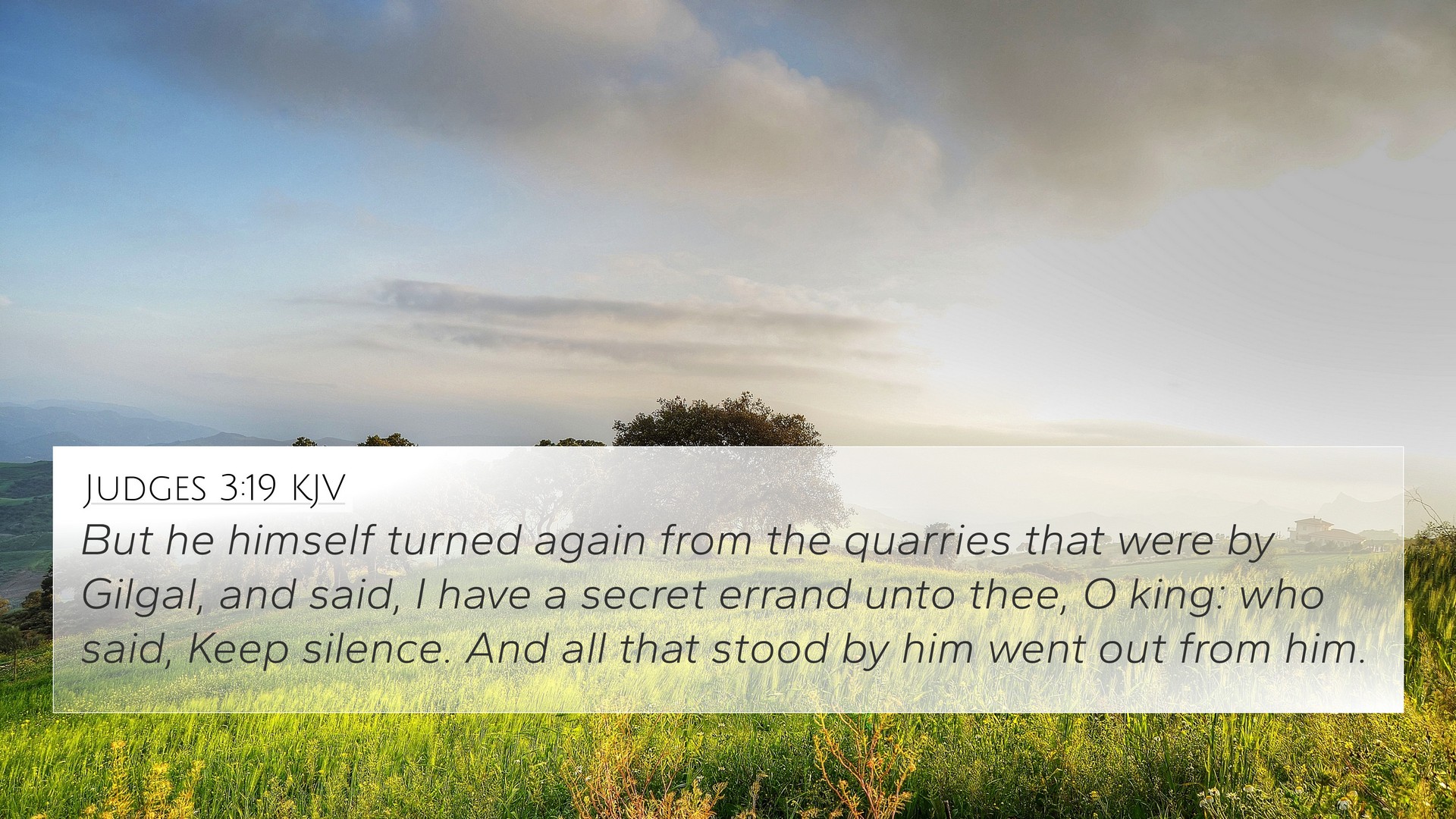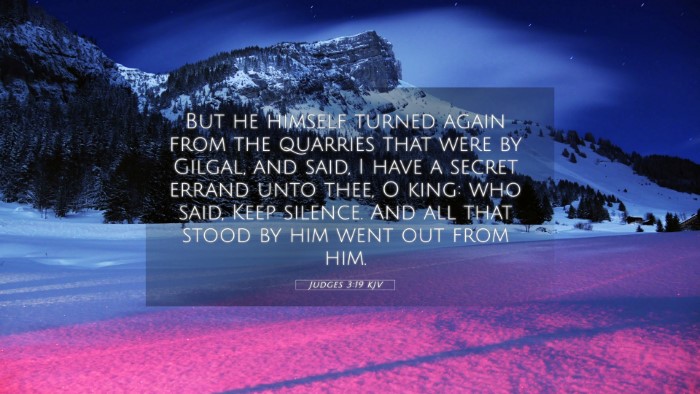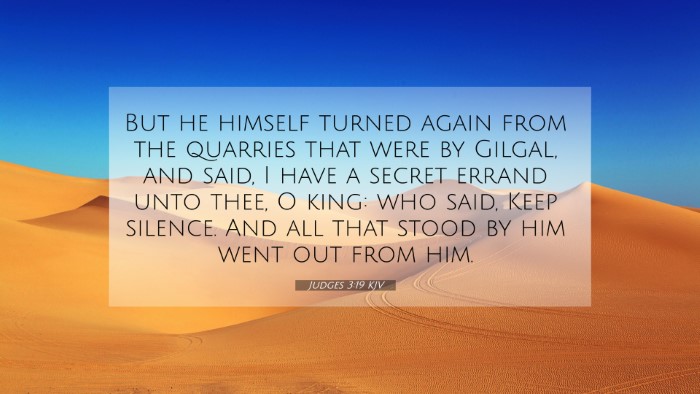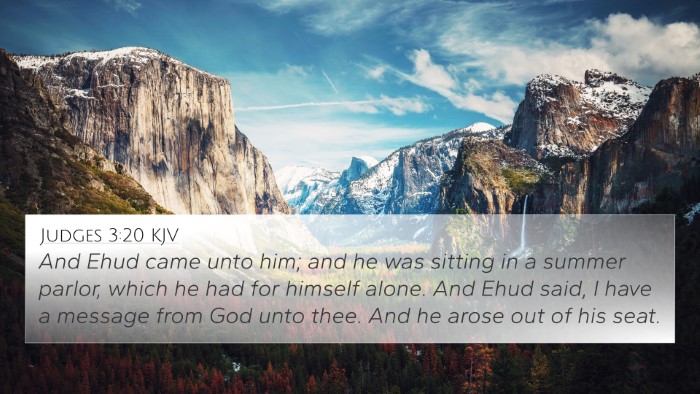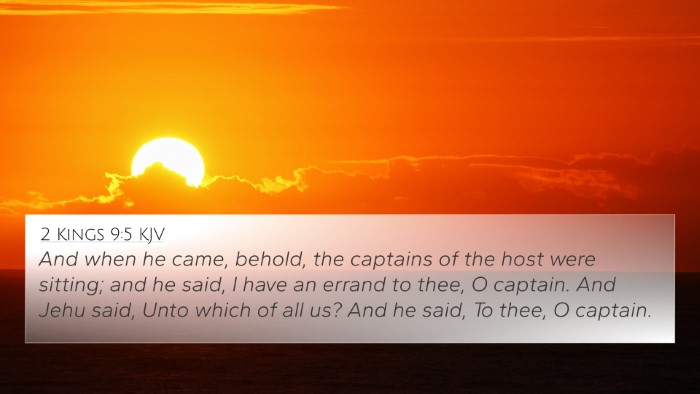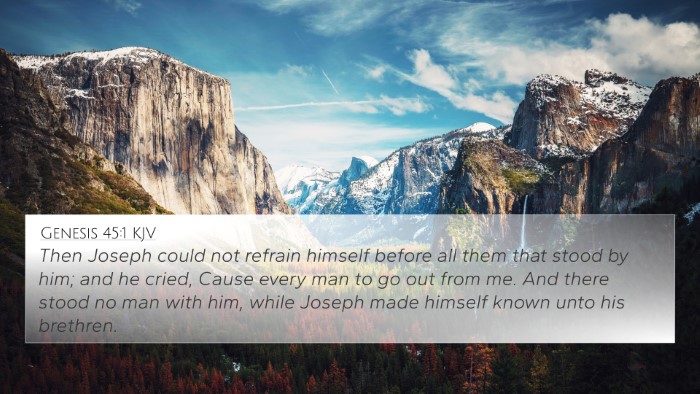Understanding Judges 3:19
Judges 3:19 reads: "But he himself turned again from the quarries that were by Gilgal, and said, 'I have a secret errand unto thee, O king:' who said, 'Keep silence.' And all that stood by him went out from him."
Summary of the Verse
This verse depicts a moment of intrigue and cunning within the narrative of Israel's history. The character involved is Ehud, who wheels an unexpected subterfuge against Eglon, the king of Moab. The verse captures the essence of strategy in warfare and espionage, revealing insights into the dynamic of trust and deception.
Commentary Insights
Matthew Henry's Commentary
Henry emphasizes the role of Ehud as both a judge and deliverer, highlighting that his actions are driven by God's providence. He notes the importance of the quarries near Gilgal as a significant backdrop that symbolizes a place of decision and transition. The secrecy of Ehud’s mission exemplifies the complex relationship between divine appointment and human cunning.
Albert Barnes' Notes
Barnes focuses on the psychological aspects of Ehud's strategy. The command to "keep silence" suggests that deception is often a necessary tactic in overcoming formidable opponents. Barnes points out that Ehud's preparation and the way he handles the situation showcases the importance of wisdom and discernment in leadership, as well as the need for divine guidance in times of conflict.
Adam Clarke's Commentary
Clarke explores the geographical and historical context of Gilgal and its relationship with Israel's past. He argues that the phrase "secret errand" signifies the divine plan at work and expresses the themes of betrayal and loyalty present in the narrative. Clarke also discusses the ramifications of Ehud's actions, which lay the groundwork for Israel's eventual deliverance from oppression.
Thematic Connections and Cross-References
This verse intricately links to several notable themes and scriptures within the Bible, providing a rich tapestry of understanding:
- Judges 3:15 - The context of Ehud's appointment as a judge and deliverer interrupts the cycle of oppression.
- 1 Samuel 16:7 - The concept of looking beyond outward appearances to understand God's choice resonates with Ehud's covert strategy.
- 2 Samuel 20:9-10 - Illustrates the theme of betrayal, paralleling Ehud’s secretive mission.
- Psalms 83:1-4 - A reflection on enemies conspiring against the people of God, similar to Ehud's circumstances.
- Matthew 10:16 - Jesus instructs His disciples to be "wise as serpents," echoing Ehud’s shrewdness in overcoming adversaries.
- Proverbs 1:10 - The importance of discernment in dealing with enemies relates to Ehud's chosen tactic.
- Isaiah 32:7 - Discusses the behavior of unscrupulous persons, shedding light on the complexities of human motives similar to the king’s response.
- Acts 16:18 - The idea of silencing disruptive influence can connect to the command to "keep silence."
- Romans 8:31 - If God is for us, who can be against us? A significant reminder of divine support in the face of opposition.
Comparative Analysis and Theological Reflections
Judges 3:19 serves as a focal point for analyzing the interplay between faith and strategy. The use of deception in service of a higher purpose invites reflection on ethical considerations in the pursuit of justice and deliverance:
- Faithfulness vs. Cunning: Ehud's narrative prompts the question of when the use of subterfuge may be justified within a divine mission.
- Divine Sovereignty vs. Human Agency: Judges’ accounts illustrate how God empowers individuals to act, but also emphasizes their choices in executing His will.
- The Role of Geography: Locations mentioned play a significant role in the narrative, symbolizing both physical and spiritual transitions for the Israelites.
Tools for Further Study
To deepen your understanding of Judges 3:19 and related concepts, consider utilizing the following tools:
- • Bible concordance: A useful resource for locating keywords and themes across the scriptures.
- • Bible cross-reference guide: Aids in finding connections between different verses that encapsulate common themes.
- • Cross-reference Bible study methods: Techniques for exploring scripture connections that enhance theological understanding.
- • Bible reference resources: Utilize comprehensive materials that shed light on related verses and themes.
- • Bible chain references: Following topics through a chain of related verses to gain cohesive insights.
Conclusion
Judges 3:19 invites its readers to explore complex layers of divine strategy and human actions. It is reminiscent of themes present throughout the Bible, inviting dialogue between scriptures and fostering a deeper understanding of faith and morality. As you study the connections between these verses, remember that each encounter with scripture can unveil new perspectives and insights into the nature of God and His workings among His people.
